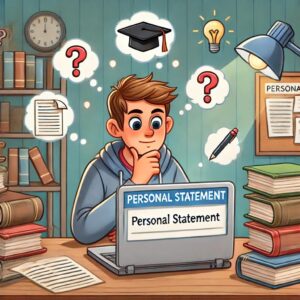
Securing a strong letter of recommendation is a crucial part of your graduate school application. Having a personal, third-party assessment of you provides depth to your application and a more granular look at who you are and what your strengths and weaknesses are. In the 15+ years we’ve worked with graduate school applicants, we have revised scores of letters of recommendation.
Though letters of recommendation are pretty standard globally, international applicants face particular challenges in this process, especially when your recommenders are not familiar with the expectations of U.S. graduate schools or do not speak or write English.
This guide offers advice on requesting and obtaining compelling letters of recommendation from professors or employers in your home country.
Selecting the Right Recommenders
Choosing the right recommenders is the first step in obtaining solid letters of recommendation that move the needle on your application. Here are some tips to help you select the most suitable individuals:
1. Choose Individuals Who Know You Well
This is the most important thing. More important than getting a big name is finding somebody who can speak with specificity about you, your strengths, and what you’ve accomplished. In many countries, particularly in Asia, more weight is perhaps placed in the name and title of the recommender, but that’s not really the case in America. The content of the letter is far more important. Having a pro forma, cliché, and short letter from a big name won’t usually help you as much as a thoughtful, in-depth letter featuring examples from somebody who knows you better but is perhaps not well-known or doesn’t have a fancy rank.
- Prioritize Academic Recommenders
Whether applying to grad school or seeking employment, it’s usually a good idea to find somebody whose relationship to you most closely aligns with the kind of thing you’re aspiring to join. In other words, if you’re looking to pursue a BioChem PhD, the head of the lab you worked in would be great. Similarly, if you’re looking to complete a History Ph.D. have a history professor who knows you well write it. In short, if you are applying for an academic program, prioritize professors who have taught you in relevant subjects or supervised your research projects. Of course, most schools require three recommendations, so reserving one of those for a professional recommender who knows you well isn’t necessarily a bad idea. BUT, make sure you have the most relevant bases covered.
3. Consider Professional Recommenders
Building on the above point, if you have significant work experience, consider asking employers or colleagues who can provide insights into your professional skills and accomplishments. The test should be, “can this person talk in depth about what I bring to the table?” If so, then when you speak to them, perhaps highlight some skills or accomplishments that they would know about that align with how you’re pitching yourself in your application.
4. Ensure Recommenders Are Respectable
All things being equal, having an impressive recommender is better than an unknown one, BUT note point #1 above. Having read letters from impressive people who didn’t actually know the candidate (or worse, didn’t think much of them), it’s obvious when you’re just getting a pro forma letter that’s not really substantive.
How You Can Help
- Follow their lead
The first thing to keep in mind is that you’re asking somebody to do you a favor. So, whatever help they ask for, or whatever process they prefer, it’s up to you to accommodate them. When I was a university professor, I probably wrote 100 letters of rec, so I was pretty familiar with all the different processes and was fine navigating things myself. I had questions I would ask, but didn’t need much help; it was part of my job, so I did it. Not everybody has this attitude and not everybody feels comfortable with their writing. Many times your recommenders will ask you to either create for them an outline or even a full draft. Ethically, they should at least read whatever letter they sign their name to so that they can plausibly say it represents their ideas. But, remember that some people want more help, others less. Conform to their requests when it’s ethical to do so.
- Use language translation services
Many people applying to American schools from overseas will want recommenders who are not English speakers to write their letters. That’s fine and a common thing. There are multiple ways do this. You can have them write the letter and then either you translate it (honestly, of course) or you pay for a translation service to do it for you. Or, you can get them to provide you an outline and you write it for them.
If you send a translated letter, some people like to add a note that says something like, “translated from Chinese by XYZ translation service.” You can attach the original if you want; doing so can help to ensure that what’s translated is honest.
Either way, we live in a highly globalized world now, so it’s not shocking that your recommenders don’t speak English.
- Ask Early
Reach out to potential recommenders well in advance, ideally at least two months before the application deadline. I would consider two weeks the minimum. This gives them ample time to write a thoughtful letter. Anything shorter than that should begin with an apology.
- Explain the Purpose
Clearly explain why you need the letter and the significance of the recommendation in the context of your application. Provide details about the program you are applying to and why you have chosen them as a recommender.
- Provide Necessary Information
Supply your recommenders with all the necessary information to write a strong letter. This includes your resume/CV, personal statement, transcripts, and any specific points you would like them to address.
- Ask them explicitly, “Can you write me a strong letter?”
As a university professor, I always viewed writing letters of recommendation as part of my job. If you took my class, I would write you one. BUT, I wouldn’t necessarily write you a strong one. I always had a frank conversation with students and would say something like, “Jane, you got a B- in my class, so this letter would be pretty mediocre.” When you ask for a STRONG letter, that allows the writer to let you know that maybe you’re just going to get a bare-bones mediocre letter… so perhaps ask somebody else.
- Offer to Discuss in Person
If possible, arrange a meeting or a call to discuss your application and how their recommendation can best support your candidacy.
- Be Respectful and Grateful
Acknowledge that writing a recommendation letter is a favor and express your gratitude for their time and effort.
Helping Your Recommenders Write Strong Letters
While your recommenders will ultimately write the letters, you can provide support to ensure they highlight your strengths effectively:
1. Provide Specific Examples
Share specific examples of your achievements and experiences that you would like them to mention. These examples help make the letter more concrete and impactful.
2. Highlight Relevant Skills and Qualities
Emphasize the skills and qualities that are most relevant to the program you are applying to, and ask your recommenders to focus on these aspects.
3. Clarify the Format and Submission Process
Inform your recommenders about the preferred format for the letter and the submission process. Some programs may have specific forms or online portals for submitting recommendations.
4. Remind Them of Deadlines
Politely remind your recommenders of the submission deadlines to ensure the letters are sent on time.
- Thank Them Sincerely
– Once the letters have been submitted, send a heartfelt thank you note to express your appreciation for their support.
6. Update Them on Your Progress
Keep your recommenders informed about the outcome of your applications. They will be interested to know where you have been accepted and your future plans.
Securing strong letters of recommendation is a vital component of your graduate school application. By carefully selecting your recommenders, effectively communicating your needs, and supporting them in writing compelling letters, you can enhance your chances of being admitted to your desired program. Remember to show appreciation for their time and effort, as their endorsement is a valuable part of your academic and professional journey.
For more help with your personal statement, check us out at Gurufi.com. Our personal statement editors and consultants have decades of experience helping clients get into top Masters and Ph.D. programs in STEM, humanities, fine arts, and social sciences. Our specialty is helping you craft compelling personal statements that move the needle in your admissions process! For questions, shoot us an email at service@gurufi.com. Check us out on Facebook, Twitter, and LinkedIn.









